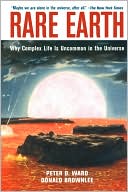Ye Olde Natural Philosophy Discussion Group
Reviews and comments on
Peter D. Ward & Donald Brownlee:
Rare Earth: Why Complex Life Is Uncommon in the Universe [2004]

This book doesn’t talk much about SETI (the search for intelligent life in the universe). It addresses something that is a prerequisite to that, namely just how common complex life in general is likely to be, including even primitive forms of animal life. It comes to the conclusion that complex life must be very rare.
This book (and that conclusion) came as something of a surprise to many of us in our book club. The book was recommended by Forrest, our newest member, and I think we all owe him a vote of thanks for this recommendation, since we all liked the book a lot. Our average rating (on a scale of 0 to 10) was 8.7, which is very high for us.
Forrest had read the book some time earlier, and only mentioned that it had a great many interesting things to say. Rosie said that the book was very well written and was very interesting. In fact, she loved the book. She thought it presented many very good arguments that animal life is rare in the universe, but she was still not completely convinced by it. That is, she still doesn’t think complex life is quite as rare as the authors say. But there were certainly many good things in the book.
Kirby hadn’t quite finished the book yet, but remarked that it was the “best book I never finished” (in time for the book club meeting). He feels that humanity doesn’t yet know enough to firmly draw the conclusion that animal life is extremely rare. But Kirby said the book is well written and presents a strong argument.
Scott was very impressed by this book, and gave it a rating of 10. He quoted George Bernard Shaw’s remark after he had read Marx’s Capital: That for him “it achieved the greatest feat of which a book is capable—that of changing the minds of people who read it.” Rare Earth similarly changed Scott’s mind on the question of just how common complex life might be in the universe. While he agrees with the point made by Kirby, that humanity hasn’t learned enough to be entirely sure about the question, still Scott thinks that the authors made a really good argument that animal life must be much less common in the universe than he had previously supposed. He doesn’t go so far as to agree with the suggestion of the authors that intelligent life on Earth might be entirely unique, however!
In addition to the central argument, this book gets into lots of scientific issues which lend support to that argument. It provides very interesting discussions on planetary astronomy, geophysics, geology, biology, and related topics. Scott feels the book provides a broad scientific education on many issues that he has not seen adequately discussed elsewhere. One particular example is the apparent importance of plate tectonics on a planet for the the promotion of animal life.
Barbara said she read the book cover-to-cover and really enjoyed it. She was fascinated by the “Snowball Earth” theory, that on at least one occasion the entire Earth may have been covered by ice. She said it was a really interesting book. She wasn’t particular fond of the discussion of the Drake Equation, however. Kevin didn’t finish the book and just skimmed parts of it. He doesn’t agree with the “Rare Earth” theory on the grounds that we just don’t know enough yet to come to that conclusion.
Rich agreed with a lot of what others were saying about it, and added that there was a lot of good science in the book. He felt the authors did prove their thesis that animal life is rare in the universe. John hadn’t finished the book yet, but liked it a lot. He loves the way it is written. John also wondered if Isaac Asimov’s supposition in his science fiction books might turn out to be correct—that it will be up to earth to populate our galaxy with intelligent life. (Scott wonders, however, if we have sufficient intelligence to not kill ourselves first!)
Ron wondered if the book didn’t suffer somewhat from the common invalid argument that everything has to be exactly “just right” for some complex result to occur (in this case animal life). (This is what Ron characterizes as the “Goldilocks theory”!) This is a good point; if things had been different on earth in certain ways maybe there might have been a different path to complex life, rather than no possible path! Ron agrees that the book does include a lot of good science, but disagrees with the highly negative conclusion.
Overall, our group liked this book a whole lot, though we are not as certain of the conclusion that complex life is quite so rare in the universe as the authors claim. I think all of us still have doubts that this remains the final word on the topic.